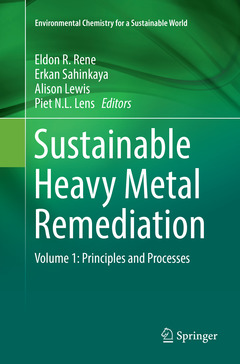Description
Sustainable Heavy Metal Remediation, 1st ed. 2017
Volume 1: Principles and Processes
Environmental Chemistry for a Sustainable World Series, Vol. 8
Coordinators: Rene Eldon R., Sahinkaya Erkan, Lewis Alison, Lens Piet N.L.
Language: English
Subjects for Sustainable Heavy Metal Remediation:
Publication date: 06-2018
Support: Print on demand
Publication date: 08-2017
Support: Print on demand
Description
/li>Contents
/li>Biography
/li>Comment
/li>
This book covers the principles, underlying mechanisms, thermodynamic functions, kinetics and modeling aspects of sustainable technologies, particularly from the standpoint of applying physical, chemical and biological processes for the treatment of wastewater polluted with heavy metals. Particular emphasis has been given to technologies that are based on adsorption, electro-coagulation, bio-precipitation, bio-solubilization, phytoremediation and microbial electrolysis.
Metal contamination in the environment is one of the persisting global issues. The adverse health effects of heavy metals on human beings and its impact on the environment has been well-documented. Several physico-chemical and biological technologies have been successfully implemented to prevent and control the discharge of industrial heavy metal emissions. On the contrary, metal resource depletion has also accelerated dramatically during the 20th century due to rapid advances in industrial engineering and medical sciences, which requires large amount of raw materials.
To meet the global metal demand, in recent years, novel research lines have started to focus on the recovery of metals from metal contaminated waste streams. In order to conflate both metal removal and recovery, new technologies have been successfully tested, both at the lab and pilot-scale. The target audience of this book primarily comprises of research experts, practicing engineers in the field of environmental/chemical technology and graduate students.
1: Metal removal and resource recovery technologies from waste stream.- 2: Modeling aspects of bio-sorption for heavy metal removal from wastewater using microbial biomass.- 3: Biosorption and permeable reactive barriers.- 4: Precipitation.- 5: Phytoremediation of landfill leachate.- 6: Recovery of metals through bioelectrochemical treatment systems.- 7: Bioprecipitation of metals and metalloids.- 8: Biosolubilisation of metals and metalloids.
Describes physico-chemical and biological technologies implemented in practice to prevent and control the discharge of industrial heavy metal emissions
Covers aspects on principles, underlying mechanisms, thermodynamic functions, kinetics and modeling of different sustainable technologies used to treat heavy metal contaminated effluents
Provides case-studies pertaining to the use of sustainable technologies for heavy metal removal and recovery from mining and metallurgical wastes, construction and demolition wastes, spent catalysts and electronic wastes
These books may interest you

Microbial Biosorption of Metals 158.24 €



